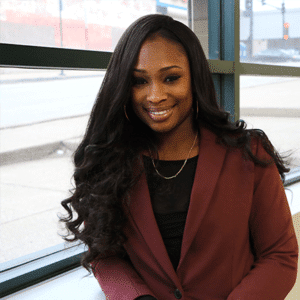
Meet Shalonda Carter, a mother and passionate advocate for women and children. After completing a Bachelor’s Degree in Community Health Education, Shalonda specifically sought out a career path that would allow her to support and empower new mothers and children who were in most need.
For the past four years, she has worked for Catholic Charities as a community-based Doula at the Jadonal E. Ford Center’s Roseland Adolescent Parenting Program on Chicago’s South Side. She currently supports eight expectant mothers as they prepare to be new mothers.
Shalonda sees her career as a calling, not a job, and strives to give new mothers a voice in their pregnancy by ensuring they know their rights regarding the birth of their child.
Recently, we sat down with Shalonda to find out more about what being a doula means to her and why it is a critical component of early education.
- For those who are not aware, what does a Doula do?
A Doula is a non-medical labor support educator and specialist. We empower, support and comfort those in need, aiding them a safe and memorable birthing experience. As a Doula, it is my responsibility to inform and educate families about the different medical interventions, comfort measures, patient rights, and other topics related to childbirth and post-partum education. In my role as a Doula, I accept moms between the ages of 13-21 who are in entering into their third trimester. Doulas are required to have a series of monthly home visits with the participants to ensure they are able to not only retain the information, but to also make informative decisions. - How do Doulas differ from a Home Visitor and how do you work together?
Doulas work alongside with Family Support Workers to further assist with infant milestones and to ensure that they are on target with development. They also assist with helping the mom reach educational, housing, and employment endeavors. This includes referring clients to services outside sources. While Doula’s discontinue services as baby reaches 2 months, Family Support Workers continue service until program completion when baby reaches 3 years of age. - What does being a Doula mean to you?
Being a Doula is the equivalent to being a light in darkness. When they feel they have no one in their corner there are Doulas cheering them on. Often times, our young participants aren’t aware of what is happening to their bodies nor do they understand prenatal child development. With my participants, I take pride in educating them and removing the fear of the unknown. It also means being the face of confidence and vocal protection. It is very important for me to educate my participants on their rights regarding the birth of their child and give them the voice that they don’t think they have. Being a Doula also means taking a holistic approach to servicing not just the pregnant mother, but the entire family. It is very important that I build a relationship with my participant’s support system in order to ensure that mom is happy and has a positive experience. - What advice would you give to a new parents who are unsure if they need the assistance of a Doula?
For parents who are unsure of Doula services, I’d say to give it a try before you say no. You will most definitely remember your birth experience but you will also never forget your Doula who never left your side. Through a program like Roseland Adolescent Parenting Program, our services are free. Our goals are having your best interest and infant’s at heart. What keeps me going are simple wins like hearing your client say, “Thank you so much for helping me out. I’m so grateful to have found this program and you! I can’t thank you enough.” It warms my heart and it has humbled me. I wish for every woman with-child to have a Doula and a great birth experience.


